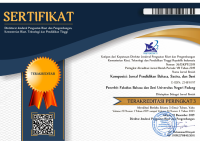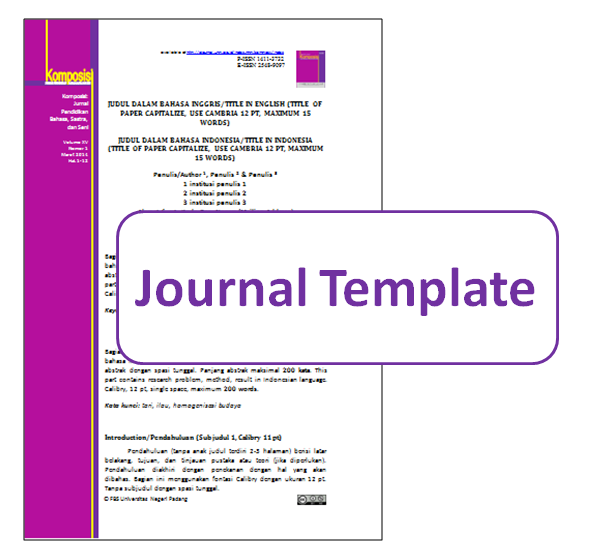Rhetorical Structure and Linguistic Features of Abstracts: A Comparative Study Of Local, National And International Journals In English Education Written by Indonesian Authors
Abstract
The abstract is an important part of a research article; it is a research summary that must be attached, presented together with the research article. Therefore, the quality of an abstract is explicitly significant. This article aims to determine the similarities and differences of the rhetorical moves and linguistic features of abstracts of local, national, and international journals by Indonesian authors in the field of English language teaching. The method used is descriptive quantitative and qualitative methods or mix-methods by analyzing the communicative objectives and linguistic features of the abstract parts of research articles. The results show that the majority of Ijal abstracts have five moves while the majority of Edu-Ling abstracts have only three moves. In general, active sentences are used more dominantly used than passive sentences in all moves of all three groups of abstracts, and present tense is far more frequently used in Ijal and Teflin abstracts but past tense is more frequently used in Edu-Ling abstracts while that-complement clause in Move-4 of Ijal abstracts is the most frequently used among the three groups of abstracts. It can also be concluded that Teflin article abstracts are more similar to those of Ijal articles than to Edu-Ling articles in all aspects. This is probably because Teflin authors are more experienced in writing journal articles than those of Edu-Ling articles.
Keywords
Full Text:
PDFReferences
Alvin, L. P. (2014). The passive voice in scientific writing. The current norm in science journals, Journal of Science Communication, 13(1), 1-16. https://jcom.sissa.it/ archive/13/01/JCOM_1301_2014_A03
Al-Shujairi, Y. B. J.; Ya’u, M. S. & Buba, J. A. A. (2016). Role of moves, tenses, and meta-discourse in the abstract of an acceptable research article, Mediterranean Journal of Social Sciences, 7(2), 379-386. DOI: 10.5901/mjss.2016.v7n2s1p379
Arsyad, S., & Arono (2018). Memahami dan Menulis Abstrak Artikel Jurnal. Bogor: Halaman Moeka Publishing.
Arsyad, S. (2014). The discourse structure and linguistic features of research article abstract in English by Indonesian academics, Asian ESP, 10(2),191-224. https://www.researchgate.net/publication/289858698_The_discourse_structure_and_linguistic_features_of_research_article_abstracts_in_english_by_Indonesian_academics
Banks, D. (2017). The extent to which the passive voice is used in the scientific journal article, 1985–2015, Functional Linguistic, 4(12), 2-17. DOI 10.1186/s40554-017-0045-5
Belcher, W. L. (2009) Writing a journal article in 12 weeks: A guide to academic publishing success. London: SAGE Publication Inc.
Brown, J. D. (1996) Testing in language programs. Englewood Cliffs, NJ: Prentice-Hall Regents.
Cargill, M., & P. O’Connor (2009). Writing a scientific research article: Strategy and steps. Oxford: John Wiley and Son Ltd.
Connor, U., E. Nagelhout & W. V. Rozicky (2008). Contrastive Rhetoric: Reaching to Intercultural Rhetoric. Amsterdam: John Benjamins Publishing CO.
Dudley-Evans, T. (1994). “Genre Analysis: An Approach to Text Analysis for ESP‟, in M. Coulthard (ed.). Advances in written text analysis. London and New York: Routledge, 219-228.
Emeksiz, Z. E. (2015). Stance-taking and passive voice in Turkish academic discourse, Journal of Language and Linguistic Studies, 11(2), 13-22. https://files.eric.ed.gov/fulltext/EJ1105160.pdf
Lores, R. (2004). On RA abstracts: From rhetorical structure to thematic organisation. English for Specific Purposes, 23(3), 280-302. https://doi.org/10.1016/j.esp.2003.06.001
Forester, M. (2018). Rhetorical Moves for Writing Abstracts. Retrieved May 2, 2019 from https://blog.taaonline.net/2018/08/5-rhetorical-moves-for-writing-abstracts/
Fartousi, H., & F. P. Dumanig (2012) A rhetorical analysis and contrastive rhetoric of selected conference abstracts, World Applied Sciences Journal, 18(4), 514- 519. Retrieved July 15, 2013 from http:// idosi.org/wasj/wasj18(4)12/8.pdf.2012.
Huckin, T. N. (2001) Abstracting from Abstract, in M. Hewing (ed.) Academic Writing in Context. Birmingham: University of Birmingham Press.
Hyland, K., & P. Tse (2005). Hooking the reader: a corpus study of evaluative that in abstracts, English for Specific Purposes 24, 123–139. https://doi.org/10.1016/j.esp.2004.02.002
Pedretti, M. (2018). 4/25 TAA Webinar: ‘How to Structure and Write an Article Abstract’. Retrieved May 2, 2019 from: https://blog.taaonline.net/2018/04/4-25-taa-webinar-how-tostructure- and-write-an-article-abstract/
Kanoksilapatham, B. (2005). Rhetorical structure of biochemistry research articles. English for Specific Purposes, 24(3), 269-292. https://doi.org/10.1016/j.esp.2004.08.003
Safnil (2001). Rhetorical Structure Analyses of the Indonesian Research Articles, unpublished Ph.D. Dissertation, the Australian National University, Canberra Australia.
Swales, J., & C. B. Feak (2009). Abstracts and the writing of abstracts. Michigan: The University of Michigan Press.
Swales (2004). Research genres: Exploration and applications. Cambridge: Cambridge University Press.
Wang, S. P., & P. N. Tu (2014). Tense use and move analysis in journal article abstracts, Taiwan Journal of TESOL, 11(1), 3-29. https://files.eric.ed.gov/fulltext/EJ1078991.pdf
Zhang, B., Q. B. T. Thuc & I. Pramoolsook (2012). Move and linguistic realizations: English research article abstract by Vietnamese agriculture researchers, Asian ESP Journal, 8(3), 126-149. https://doi.org/10.1177/2158244018822384 SAGE Open January-March 2019: 1–9 © The Author(s) 2019 DOI: 10.1177/2158244018822384
Zhou, X. & Liao, H. (2018). A comparison of abstract writing style between English and Chinese. Journal English Language Teaching, 11(3) Published by Canadian Center of Science and Education. URL: http://doi.org/10.5539/elt.v11n3p18
Zhang, B., NBT Thuy & I. Pramoolsook (2017). Moves and linguistic realizations: English research article abstracts by Vietnamese agricultural researchers. The Asian ESP Journal, 8 (3), 126-149. Retrieved July 15, 2013 from http://asian-esp-journal. com/Volume 8-3 Pdf. October 2012.
DOI: https://doi.org/10.24036/komposisi.v22i1.109987
Refbacks
- There are currently no refbacks.
Copyright (c) 2021 Komposisi: Jurnal Pendidikan Bahasa, Sastra, dan Seni

This work is licensed under a Creative Commons Attribution-NonCommercial 4.0 International License.
Komposisi: Jurnal Pendidikan Bahasa, Sastra, dan Seni, a peer-reviewed online journal in languages, literature, and arts education.
Printed ISSN 1411-3732, Online ISSN 2548-9097.
Currently, Komposisi: Jurnal Pendidikan Bahasa, Sastra, dan Seni is indexed by:
Published by:
Universitas Negeri Padang (UNP)
Address: Faculty of Languages and Arts (FBS) Universitas Negeri Padang.
Jl Prof. Dr. Hamka Air Tawar Barat, Padang - West Sumatera -Indonesia
Telp/Fax. +62751 7053363
Home page: http://ejournal.unp.ac.id/index.php/komposisi | e-mail:komposisi.fbsunp @ fbs.unp.ac.id | cc: havid_a @ fbs.unp.ac.id
slot resmi
situs toto
situs toto toto slot
Wanita Subang Beli mobil dari Nolimit city
Gatot kaca Buat TKW Jadi jutawan
Rahasia sukses bermain Mahjing wins
rahasia sukses bermain mahjong ways
div>











